Welcome to the June News!
The Montesoro Legacy has been awarded a B.R.A.G. Medallion.
Huzzah for Leo and Mariella!
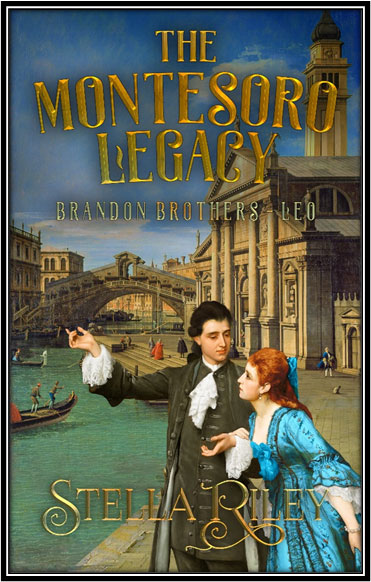
I’m delighted to announce that Leo’s story scored 5/5 on all of the 10 categories in which it was judged. Here’s what the reviewers had to say.
“This author has a consistently high standard of writing and story-telling which stands out in the genre. Her use of appropriate language, manners and social mores of the day, even of the time taken to travel from place to place, is meticulously researched and when I read her books, I am instantly transported to another, earlier time.”
“I appreciated this book from the standpoints of women's rights and the portrayal of people with high functioning autism.”
Nothing is definite yet but Alex will hopefully record The Montesoro Legacy soon for a late summer release. E-book, paperback & hardback available from Amazon.
This month’s trivia … THE GRAND TOUR – Episode Three
You’ll have gathered by now that the Grand Tour generally lasted at least two or three years and was correspondingly expensive. But it was very much regarded as a ‘rite of passage’ for young English gentlemen. The clothes and manners of noble society, the understanding and appreciation of art – even the facing and enduring the frequent perils of travel – were all part and parcel of it. And the young man who returned home would be very much more worldly and confident than the one who had left.
Or perhaps he came back an out-and-out playboy like Sir Henry Fetherstonhaugh. Huzzah Hal spent his tour ignoring culture in favour of fun between the sheets and returned to his estate at Uppark, West Sussex, a life-long party animal. When his mistress, Emma Hart, became pregnant he ditched her - thus leaving her free to marry Sir William Hamilton and have an affair with Lord Nelson. Henry, however, didn’t settle down until he was 71 – marrying his 20-year-old dairy maid and leaving her Uppark when he died, aged 92.
But we left young Lord Fleet about to exchange Florence for Rome – so let’s catch up with him there.
On arrival in Rome, his lordship would begin by engaging an expert antiquarian to guide him through all the major sites of the Eternal City.
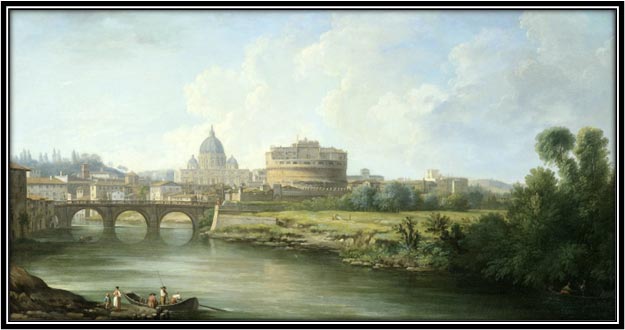
View of St. Peter’s Basilica and Castel Sant'Angelo
|
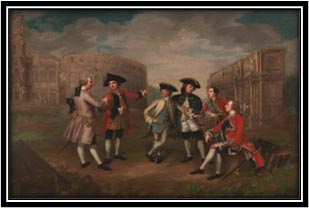
Grand Tour Gentlemen
discussing Art in Rome
|
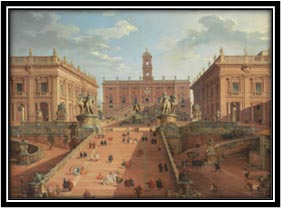
The Capitoline Hill
|
|
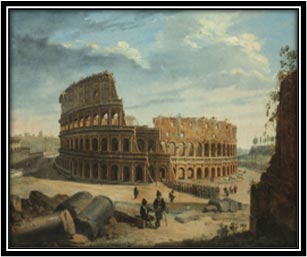
The Colosseum
|
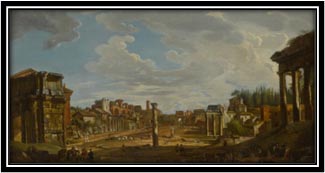
The Forum
|
He’d tick the Colosseum, the Pantheon, the Roman Forum and St Peter’s Basilica off his list, to name but a few.

Sistine Chapel the creation of Adam by Michelangelo
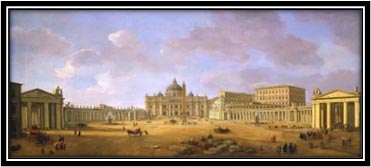
St. Peter's Basilica |
He’d visit numerous churches in search of art and marvel at the ceiling of the Sistine Chapel. If his family was sufficiently prominent, he might even get an audience with the Pope.
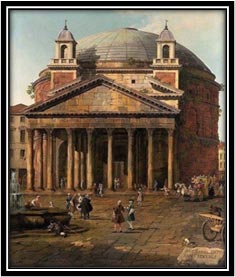
The Pantheon by Canaletto |
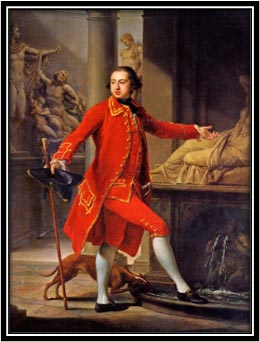
Pompeo Batoni -
Portrait of Thomas Dundas |
At some point along the way, he’d probably have his portrait painted – possibly in costume, leaning negligently against some monument or other.
A Roman artist who specialised in portraits of this type was Pompeo Batoni. Out of 225 known portraits by him, 175 are of British Grand Tourists.
|
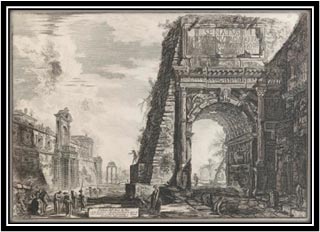
View of the Arch of Titus
|
|
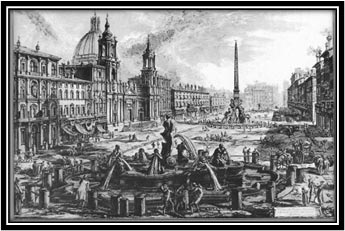
View of the Piazza Navona
|
Lord Fleet would also purchase etchings of various views – those of Giovanni Battista Piranesi being the most sought-after.
And he’d certainly go home with an antique or two.
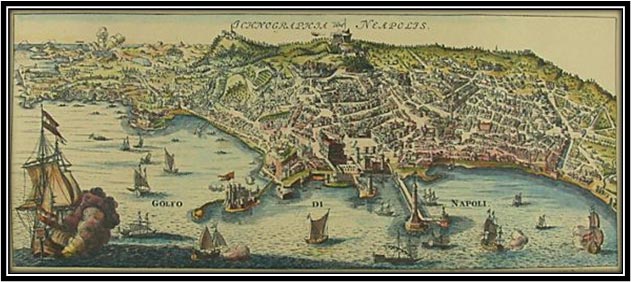
18th Century map of Naples
|
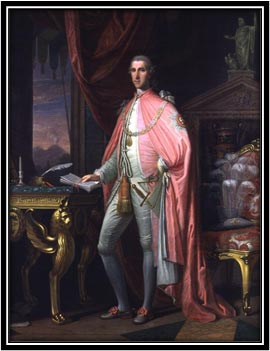
Sir William Hamilton
|
His lordship’s next – and final Italian destination – was Naples where, between 1764 and 1800, the British Ambassador was the aforementioned Sir William Hamilton.
Sir William was an avid collector of paintings, sculptures and the antiquities of Greece and Rome.
His knowledge and connections were such that he could usually locate any specific artifact a discerning Grand Tourist might be seeking – probably, since Sir William wasn’t a particularly wealthy man – for a small fee.
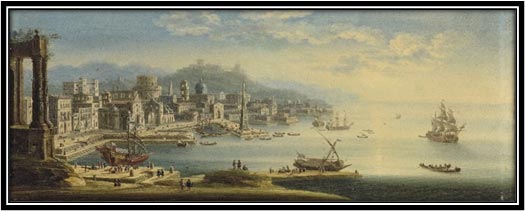
Naples mid-18th Century
Aside from the usual social pleasures, Naples provided an opportunity to climb the lower slopes of Vesuvius – possibly at night in the hope of witnessing one of the periodic eruptions.
|
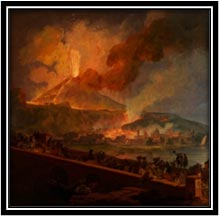
Vesuvius erupting by
Joseph Wright
|

Destruction of Pompeii and Herculaneum
|
The artist Joseph Wright visited Naples between 1773 and 1775 and was fascinated by the volcano – repeatedly painting it mid-eruption. Since, in fact, Vesuvius didn’t erupt at all during the time he was there, he was obviously forced to rely on his imagination.
|

Excavation of Pompeii
|
Lord Fleet would probably also take a trip out of Naples to see the excavations taking place at Pompeii and Herculaneum.
These had begun first in 1738 at Herculaneum; Pompeii wasn’t discovered until ten years later.
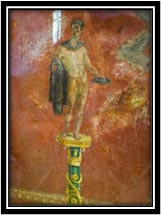
Pompeii fresco
|
But during his lordship’s visit the excavations must have been on-going, with much that we can see today yet to be discovered.
One wonders what he made of it.
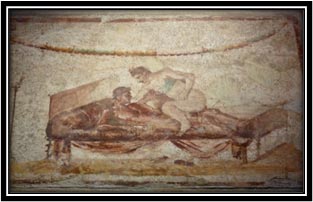
Pompeii fresco
|
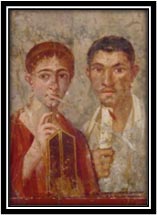
Pompeii fresco
|
For many, Naples marked the end of their Grand Tour. Visitors today (myself included!) find it difficult to believe that in the 18th century Naples was accounted one of the most beautiful cities in Italy, thus coining the phrase “See Naples and die” – meaning that nowhere else could compare with it.
My husband and I were there during a particularly scruffy phase; the refuse-collectors were on prolonged strike – with the obvious result. But the friendliness of the Neapolitans made up for the city-wide mess.
But some Grand Tourists who could afford to do so and had caught the travel-bug continued their journey to Athens, Constantinople and beyond.
Athens is the only city amongst all of those mentioned since Lord Fleet left Dover that I haven’t visited.
|
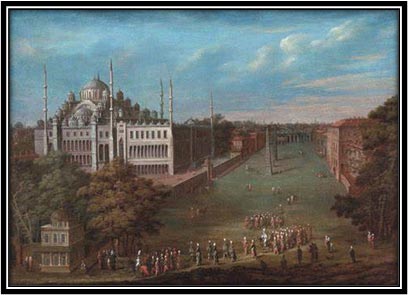
Blue Mosque and the Hippodrome - Constantinople
|
But I know Constantinople – now Istanbul very well; it’s a particular favourite of mine and comes highly recommended.
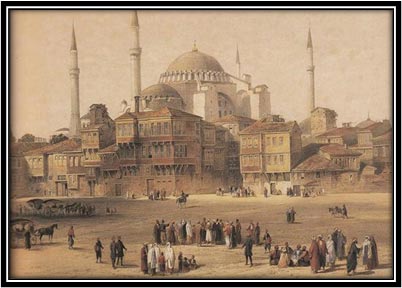
Haghia Sofia - Constantinople |
Lord Fleet would have returned to England with his souvenirs, his memories and tales to tell his friends over a glass or two at his club.
If he was exceedingly lucky that’s all he’d take home with him.
Thanks to all that foreign bed-hopping, many gentlemen also returned with something less pleasant.
A night with Venus and a month with Mercury, as the saying goes.
But that’s Georgian society for you.
There won’t be a newsletter in July because I won’t be back from holiday in time to prepare it. So, until August, happy reading and listening.
Stella
![[facebook]](https://www.writerspace.com/newsletter/facebook.png) ![[twitter]](https://www.writerspace.com/newsletter/twitter.png)
|
